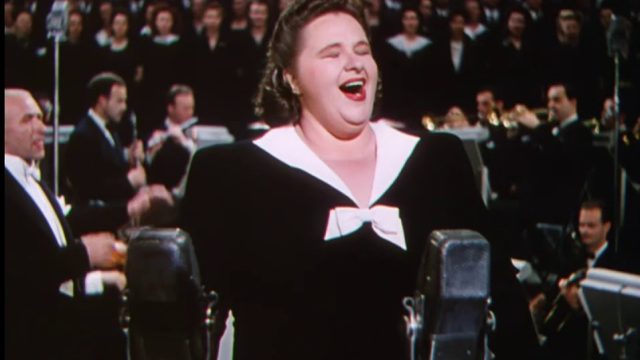If Paul Robeson sang a song, famously recorded a song, does a white woman who also sang it—and let’s be clear didn’t write it—and recorded it deserve to be canceled? Is removing a statue of her just as morally justified as removing the statue of a Confederate? And I mean, as a fellow white woman, I am absolutely the wrong person to respond to that question. It’s true that “the Songbird of the South” (she was from Washington, D.C.) was at bare minimum upper middle class, but it’s also true that she did a radio plea in 1945 for racial tolerance, still kind of a controversial position in those days.
Not that Kate Smith was unfamiliar with being othered herself, though it doesn’t at all compare. An early New York Times review of her specifically calls attention to her weight. She performed in a show where her role was to be insulted for being overweight, which apparently led to regularly crying in her dressing room backstage. To me, at least, it feels impossible not to feel pity for her, even if she also performed in blackface in those days. It was the late 1920s, and while that doesn’t make it right, it means that people weren’t necessarily aware that it was wrong.
Kate Smith is probably best known for her rendition of “God Bless America,” itself not exactly an unproblematic song. I remember singing that song myself as a child, which they probably shouldn’t have had us do in the schools. (In fact, a little reflection shows I still remember the lyrics, because it’s amazing what your brain holds onto.) That said, she had a lot of hit songs, and an album that charted as late as 1978. She also did “(There’ll Be Bluebirds Over) The White Cliffs of Dover,” one of several covers she did that was extremely successful.
Smith seems to have been a large, cheerful, friendly person who was made fun of for literally all those reasons. Another radio personality thought her greeting of, “Hello, everybody!” was condescending and assumed everybody was listening, whereas it seems to me to be a kindly greeting to everybody who actually is listening. If you entered a room and said, “Hello, everybody!” it wouldn’t be because you assumed literally everyone was in that one room. That didn’t prevent him from having a greeting of, “Good evening, anybody,” for the entirety of his run.
There’s a reality that Smith only has writing credit on one song, and it’s not known how much actual input she had on it. She had a TV show, but while she’s listed as a writer, how much actual writing she did on that is also a question. Smith spent her career performing other people’s works. Goodness knows there’s nothing wrong with that; it’s true of a vast majority of the people we’ve covered over the years in this column and the other one. But one of the songs people criticize that she sang was written in part by Fannie Hurst, author of Imitation of Life and friend of Zora Neale Hurston, and the other was covered by Paul Robeson as well, and it’s a much longer conversation than the easy “slavery was bad” that makes taking down statues of Confederate generals such an easy, obvious choice.
Support me for considering all sides of the issue by contributing to my Patreon or Ko-fi!


